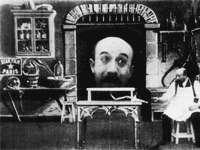Lumière v. Méliès: A Cinematic Dichotomy

“In art we are once again able to do all the things we have forgotten…walk on water…speak to angels…move unfettered among the stars.”
–Madeline L’Engle (Walking on Water)
Cinema is about sharing not only what we see, but how we see it. For some directors of cinema the goal is re-presentation or documentation of reality presented before them; for others, reality is re-cast in light and shadow as a cinematic parable or fantasy. The “reality” and the “fantasy” each embue their own unique conveyence of truth. Can there be true “truth” in cinema? That quest dates back to the inception of the film medium.
In the late 1800s, French film pioneers Auguste and Louis Lumière set out to document the marvels of the world with their film camera.
It’s hard for us to believe–as our eyes have long been trained–but when the Lumières first projected the image of a train arriving at a station, it is said that the audience leapt from their seats and fled the building in fear. For the Lumière brothers the goal was to present snapshots of daily life–“realities”–which included films of workers leaving a factory, a couple and their baby eating, a gardener watering his flowers.
And then their was Méliès (1861-1938), the magician, casting child-like visions and fantastical journeys (inspired by Jules Verne) onto the screen. Méliès worked almost entirely in the studio. He was the first in the history of the film medium to contrive elaborate special effects and bring into play elborate sets that were supposed to simulate the surface of the moon or North Pole (complete with giant snow monster).
The tension created between these two approaches is known as the “Lumière/ Méliès Dichotomy”. The lines between the two are often blurred today as filmakers create “fantasies” so convincing as to be reality; or they document “realities” which are so bizarre that we would prefer them to be fantasies. There are many talented directors whose unique way of seeing and sharing their vision force us to re-train, if you will, our eyes how to see. Some of these talents are featured to the right.
Questions
Lumière* Focus = Actual
* Shot on location
* Document events
* Camera role = witness real event
* Truth = Surface
Méliès
* Focus = Fantastical
* Shot in studio
* Tell magical stories
* Camera role = make fantasy believable
* Truth = Embedded

